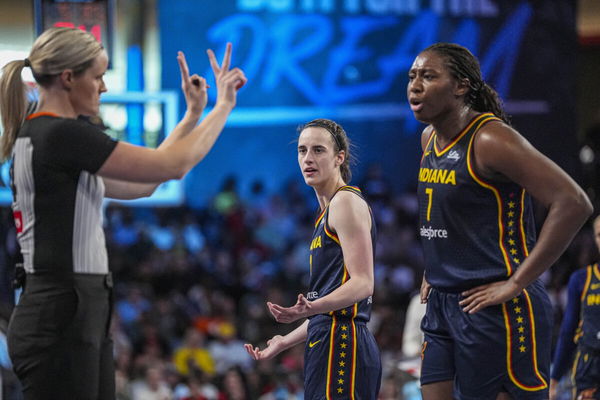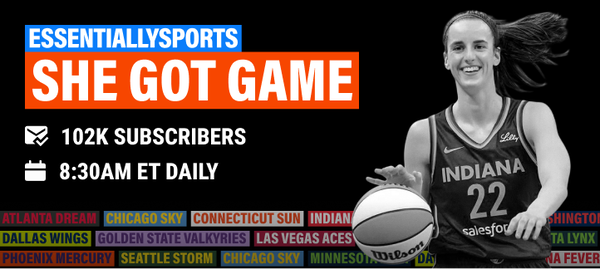
Imago
May 10, 2025; Atlanta, GA, USA; Indiana Fever guard Caitlin Clark (22) reacts to being called for a technical foul during the game against the Atlanta Dream during the first half at Gateway Center Arena @ College Park. Mandatory Credit: Dale Zanine-Imagn Images

Imago
May 10, 2025; Atlanta, GA, USA; Indiana Fever guard Caitlin Clark (22) reacts to being called for a technical foul during the game against the Atlanta Dream during the first half at Gateway Center Arena @ College Park. Mandatory Credit: Dale Zanine-Imagn Images
Stephanie White knows a thing or two about playing tough and playing defense. Think 2015 Indiana Fever or last year’s Connecticut Sun. So the HC knows that whatever her team has been dealt with over the last few games is just not it. Physicality, she tolerates. But the whistles overblown or ignored? “I think it’s pretty egregious what’s been happening to us the last few games,” she made clear. And well, an analyst isn’t shying away from digging to the roots.
Watch What’s Trending Now!
Stephanie White has previously made clear she isn’t minding the calls officiating makes. But there’s one condition– keep it the same both ways. And those run-ins during the Liberty game? White agress they were anything but. Starting with the foul call on Lexie Hull that shifted the momentum– As Sabrina Ionescu drove into the paint in the final seconds, the Fever guard played good defense, merely standing to cover the shot. Just then, the Liberty star initiated the contact, drawing a whistle. More than a few nodded against it.
On the other end, fouls went unnoticed on DeWanna Bonner and Caitlin Clark. But this isn’t a one-time thing. We have seen complaints pour in from across the league. And so Rachel DeMita is hardly holding any hope in officiating making better decisions this season.
“They’re not listening to the coaches, they’re not listening to the players, they’re not listening to the fans, they’re listening to their stakeholders; that’s why I keep saying nothing is going to change,” the podcaster remarked on Courtside Club.
White and Clark voicing the concern may have been making headlines now, but the Lynx have been at it since the Finals game last year. Cheryl Reeve very clearly used the word “stolen” when talking about their defeat. Napheesa Collier hasn’t been silent either. Not just on her social media or post-game interviews, but the Lynx icon has vented her frustration on podcasts and interviews.
“I thought the officiating was terrible,” she had said on Podcast P last year. “We play a really physical game. I prefer that, actually. But, it has to be the same on both ends,” she echoed. But yet, the issues persist. Reeve had to bring up how players have been getting away with the consistent physicality against Collier after their game against the Connecticut Sun. Then we saw Brittney Griner walk away from an interview to argue with the refs.
The fans haven’t shied away from calling out the officiating, either. But even after all of that, doesn’t seem like either of the parties is being factored in by the league. Many feel unheard on the issues of officiating quality and disciplinary fairness. The change, however, needs to start at the top too.
Monty McCutchen, Senior Vice President of Referee Development of the NBA, gave more insight into who these stakeholders really are. “What actually happens is that we have a competition committee for stakeholders, coaches, governors, and general managers — and that competition committee is the committee that dictates the state of the game,” he shared via SB Nation. So DeMita isn’t blaming it all on the refs. More so, with the not-so-fine conditions they are themselves under.
The condition for referees is no better than the players
Since the WNBA is just getting off the ground, the players and the referees are still paid less than the same people on the other side of the fence in the NBA. So you have to consider that while evaluating the condition of the play too.
Even De Mita sympathized with the condition of the referees. “Like, these referees actually aren’t being paid so much, I do not want to go out and personally attack these people. I’m sure they have families and they’re just trying to make a living.” The podcaster further believes the fault lies with the league, which hires referees with limited experience. Plus, the financial stories are no better.
According to De Mita, WNBA referees receive anywhere between $35,000 and $50,000 per season as compared to $180,000 to $550,000 for the NBA referees. According to Refr Sports, the base for the NBA is even higher at $250,000 per season for rookie referees. They are also full-time employees of the league and get additional benefits of insurance and retirement.
You can see the pattern extending to the 155 players in the league. The league’s salary structure ranges from roughly $56,000 for fourth-tier players to a maximum of roughly $242,000 for “core” players. As compared to the NBA, their lowest-paid player gets around $11 million. Even Caitlin Clark, the most popular player in the league, currently earns just $78,066 for her WNBA season.
Of course, the money these two leagues generate differs day and night, as the WNBA’s estimated revenue is $200 million, while the NBA is valued at almost $12 billion. So the difference is a given. But, even with the economic factor, the players and the referees still have to make do.


